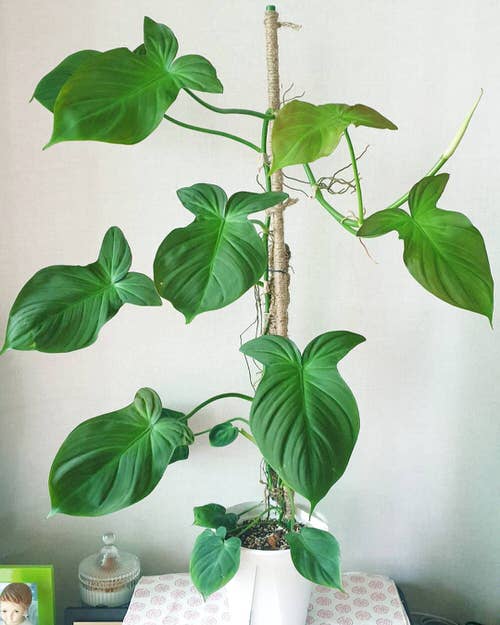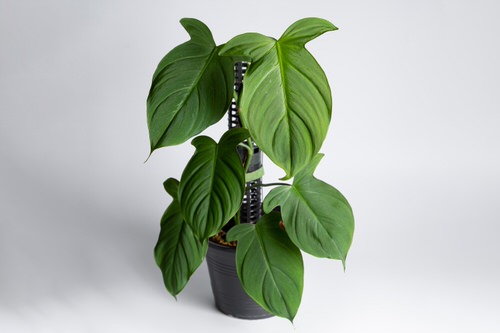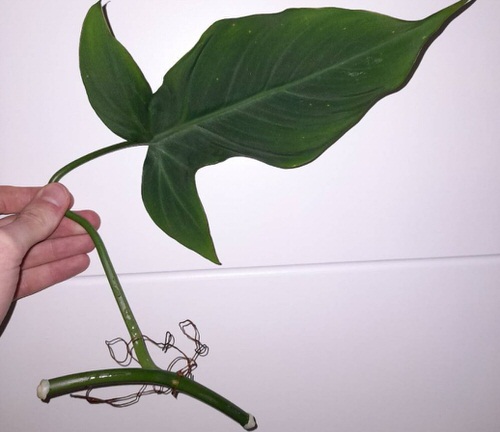Learn everything about Philodendron Camposportoanum Care and include this plant in your collection with stunning foliage!

Famous for its fascinating leaves, this small non-climber specimen is one of the easy-to-care-for plants you can ever own! Follow our guide on Philodendron Camposportoanum Care and know how to grow them quickly in detail!
Here’s how to make Philodendrons bigger and bushier
Philodendron Camposportoanum Information

Philodendron camposportoanum is an epiphytic plant, native to the tropical jungles of South and Central America. It is one of the smallest Philodendrons and can be an adorable addition to your houseplant collection. It grows up to 2-5 feet in height.
With unique foliage popular as ‘Hammer leaves’ because of their distinct tri-lobe shape, the plant also has a dark green shade and gives off a subtle pink-orange tinge in bright light.
Propagating Philodendron Camposportoanum

The best way to propagate Philodendron Camposportoanum is by cutting.
- Snip off 4-6 inches long cutting from a healthy plant using sanitized scissors. Ensure to make the cuttings right below the leaf node.
- Dip the end in a rooting hormone and plant the cutting in a well-draining potting mix.
- Water well and place the pot where it gets bright and indirect light.
- The cutting will form roots in 4-6 weeks.
Best Pot Size for Growing Philodendron Camposportoanum
You can start the plant in an 8-10 inches pot with a drainage hole at the bottom. As the plant matures, re-pot it into a size bigger container according to its growth.
Growing Requirements for Philodendron Camposportoanum

Location
Philodendron camposportanum performs best in bright but indirect sunlight, like all other varieties of Philodendrons. For best growth, keep it at an east-facing location where it gets direct mild morning sun daily for 2-3 hours.
Soil
Mostly Philodendrons love well-draining soil to grow best. The soil should be light, porous, loose, and rich in organic matter. Mix sphagnum peat moss, perlite, vermiculite, sand, lime, and shredded bark in equal quantities to make the best potting medium for the plant.
Watering
The plant needs a little more watering than other species and varieties of Philodendrons. Water it only when the topsoil feels a bit dry to touch. Do not overwater and also avoid letting the soil dry out completely.
Humidity
This plant loves humidity like no other and grows best in it. Put its pot on a tray filled with pebbles and water.
Philodendron Camposportoanum Care
Fertilizer
Feed the plant once in 6-8 weeks using a 10-10-10 or 20-20-20 blend, diluted to half of its strength. Do refer to the label for dosage and instructions. Also, avoid fertilizing in winter.
Do keep the fact in mind that these plants are not heavy feeders and feeding them too much will kill their growth.
Temperature
The best temperature range to provide this plant with is anything between 60-85 F or 15-30 C. The temperature should never drop down to anything below 55 F or 12 C as that can lead to a few complications to the plant’s health.
Pests and Diseases
Its natural enemies are mealybugs and spider mites. Misting or spritzing your plant regularly with neem oil and water mixed in a ratio of 1:3 will keep the pests away.
To keep the potential diseases at bay, keep it at an airy location and avoid overwatering.
Toxicity
Philodendrons contain calcium oxalate, which can be mildly toxic to humans and pets if ingested, causing drooling, loss of appetite, and vomiting. Keep the plant away from the reach of pets and children to be on the safe side.


